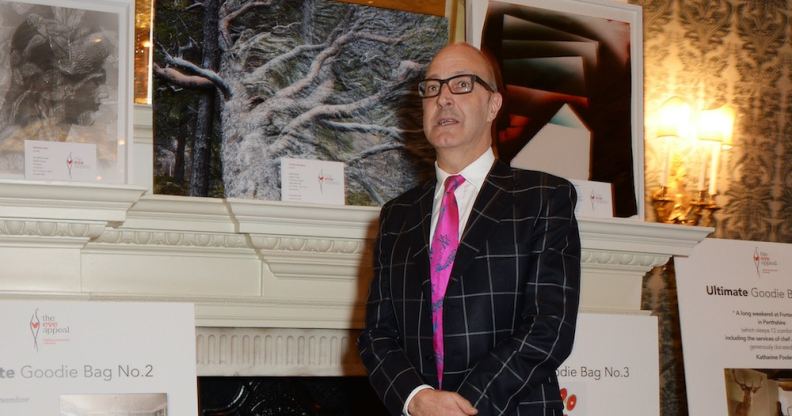Stonewall founder Simon Fanshawe thinks the dictionary’s definition of freedom is ‘ludicrous’

Simon Fanshawe. (Getty/ David M Benett)
Stonewall founder Simon Fanshawe has said it’s “ludicrous” that freedom for trans people would mean, well, the dictionary definition of freedom.
Fanshawe, who in 2019 signed an open letter declaring the charity undermines “women’s sex-based rights” by supporting Gender Recognition Act reform, was one of the 14 people who formed Stonewall in 1989.
According to the Collins English Dictionary, freedom is defined as “the state of being allowed to do what you want to do”, but Fanshawe appears to think this definition is “ludicrous”.
In an op-ed for the Daily Mail, he wrote: “‘Free to Be’, Stonewall’s new slogan claims. It is a ludicrous notion that freedom means that you can just be whatever you want.
“True freedom comes from respecting other people and finding ways to live harmoniously together.
“How bitterly ironic that the only freedom Stonewall won’t embrace is the freedom to disagree.”
Fanshawe insisted that Stonewall “has become single-mindedly focused on a particular and by no means universally accepted approach to trans rights”.
Recalling the good old days before trans people were even included in the charity’s work, the Stonewall founder said: “The lesbians, gays and bisexuals (it used, after all, to be just ‘LGB’ before it became ‘LGBTQ+’) that Stonewall was set up to defend have been all but abandoned by an organisation now pushing a divisive dogma.
“I have watched all this with mounting anger and sorrow but also fear, because this is not a minor chapter in the culture wars, but something that affects every single person living in the UK today.”
Fanshawe cited the fact that equalities minister Liz Truss is encouraging government departments to withdraw from the Stonewall Diversity Champions programme as proof that “many gay and trans people” were “alarmed” by the charity’s pro-trans rights stance and support of self-identification.
He said his criticisms of the organisation were “painful” to express, and went on to describe all of the amazing successes Stonewall has contributed to for gay, lesbian and bisexual people in the UK.
In an unintentionally ironic statement that could just as easily be applied to trans rights, he added: “We did not ask for more than straight people had, nor did we want them to give anything up. In the end, it was simply a question of fairness: a virtue the British have always prized.”
Last month, Stonewall chief executive Nancy Kelley addressed criticism by Fanshawe and another Stonewall co-founder, former Tory MP Matthew Parris, over the charity’s support of trans rights.
She wrote on Twitter that there had been a lot of “media covering the fact that a couple of our founders think we shouldn’t advocate for the rights of trans people”, and added: “Founder syndrome is a whole thing in charity world… The baby grew up, you see, and it didn’t grow up into quite the person they imagined.”
She added that the “surprising thing” about Stonewall’s founders was “not that a couple of them disagree with our inclusive stance, but that “so many of them are still right by our side” and are “powerful, compassionate activists for all LGBTQ+ people” 32 years on from its founding.

